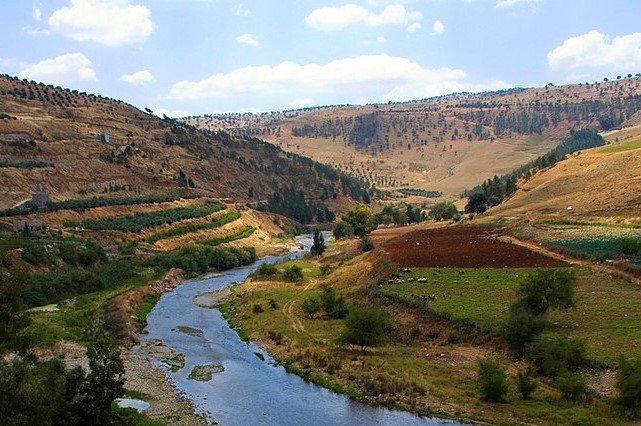In this week's Torah portion, we finished the book of Genesis.
At the center of the book are the stories of the fathers, and it is full of struggles within the family - Ishmael and Isaac, Esau and Jacob. But we end the book with unity of all the sons of Jacob in the family reunion in the land of Egypt and the blessings of Jacob to his sons. Everyone continues, and everyone has a part in the family. No rejected son!
The deep meaning of the name "Israel"
In the book of Genesis (32/28), Jacob struggles with a man, an angel of God, and at the end of the struggle, when he overcomes him, he receives his name - ISRAEL.
What does the name Israel mean? Why should Jacob's name be changed?
And what does this say about the destiny of the people of Israel?
(The picture from Wikimedia. Nachal Yabok, The place of the struggle between Jacob and the angel)
Jacob is on the one hand the "father" who ends the period of the patriarchs as individuals, and on the other hand, he is the beginning of the nation, and this is reflected in his two names - Jacob and Israel.
The name Jacob is the name given to him by his father, from a human perspective. He was named so, because he held the heels of his brother Esau (In Hebrew, the word "AKEV" means "heel", so the name "YA'AKOV"- Jacob, comes from there).
In a broader sense it means following reality - responding to it, and sometimes, in a cunning way.
The name Israel is the name given to him by the angel, the messenger of God, and is a name that symbolizes his destiny - his abilities facing God and man.
Some meanings for Israel (try reading this part in Hebrew. The English translation can`t capture the play on words, done here within the name):
Israel = The word "SAR" in Hebrew means: A minister, a ruler (rule). The word "EL" means God. So "Israel" means: Struggled with the angel and succeeded in overcoming him.
Israel = The word Israel consists of two words: "YASHAR" which means Straight, and "EL" which means God. So, the meaning of "Israel" is to be straight with God! Following the straight path that God wants.
Israel = Song of God, in exchange of letters. Rabbi Kook also interprets the name so that the people of Israel have a role to sing the song of God in the world.
It is interesting to see - when the Torah uses the name "Jacob" and when the name "Israel". Both names are the different "voices" found in Jacob's life. But since Yosef has disappeared - there is hardly any mention of "Israel", and only when Yosef returns back to the family - invisibly (when receiving information about his existence in Egypt) or visibly - in the union at the end of Genesis, does the name Israel return to appear. Only when all the tribes and all the different forces are there, can the name of Israel be used.
Welcome to look again at the end of Genesis, and think – when and why the different names appear in the different contexts and share what you found!
Jacob and the stones
When Jacob fled from his brother Esau, just before leaving his homeland, frightened, he slept at night on some stones he had collected from the stones around him, and dreamed the dream of the ladder. The dream in which he was promised that God will be with him and take care of him. The ladder, placed on earth and its head in heaven, and the angels of God ascending and descending on it, symbolize the connection between heaven and earth. When Jacob awakens from his dream, he erects a tombstone, pours oil on it and swears an oath: this bond is reciprocal, if God takes care of me on my journey, I will return here, to this stone and it will be the house of God and from everything I have - I will tithe to God.
The place is called "Beit El" - "It is not but the house of God and it is the gate of heaven" (Genesis 28:17)
The story of Jacob with the difficult exile and hardships in the house of Lavan, and eventually his return to Canaan, is also the story of his entire family later on, and of the extended family - the people of Israel, many years later. A story of faith, of hope to return to his birthplace, to the place where he received the promise of the connection to the land.
I was privileged to grow up as a child in the settlement of Beit El.
I used to walk around the mountains, sitting on them and learning the stories of the Bible, imagining and searching for the stone on which Jacob lay and dreamed his dream.
My mother Raya Brama conveyed this connection, this feeling that the stones are speaking to us, telling our national story and history, to watercolor artwork.
Stones that are not just stones, but milestones in the life of a family, in the life of a nation.
You are welcome to the ROOTS IL Art Store to choose a painting of one of these significant stones as a gift for yourself or your loved ones.



